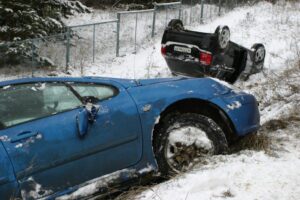
If you have nausea or vomiting after a car accident, you may be worried that you have experienced an internal injury. Or, you may brush it off as nerves after the trauma of a serious collision. However, you should always take nausea, vomiting, and other flu-like symptoms seriously.
The last thing you want is to underestimate the severity of your injuries, only to deteriorate in the hours or days after the collision. Fortunately, with help from a skilled Atlanta car accident lawyer from John Foy & Associates, when someone else is at fault for your accident, you can hold them accountable. You should not be stuck covering the costs of your medical bills, loss of income, or emotional distress due to another party’s recklessness.
Common Causes of Vomiting and Nausea After a Collision
There are multiple reasons you may be experiencing nausea or vomiting after being involved in a car accident. While your symptoms could be caused by simply being shaken up by the accident, they could also be a sign of a more serious injury. Some of the most common types of injuries that produce symptoms of nausea and vomiting after a collision include:
Traumatic Brain Injuries
If you suffer any type of head or brain injury, you may experience nausea or vomiting. Concussions can occur if your head slams into the dashboard or side of the vehicle upon impact. You may require immediate medical attention if you have suffered a concussion or a more serious traumatic brain injury.
Soft Tissue Injuries
Soft tissue injuries describe damage to the tendons, ligaments, and muscles. These types of injuries can cause nausea and vomiting due to the extreme pain that is often associated with them. Whiplash, which occurs when the force of the collision causes your head and neck to jerk violently forward and backward, is one of the most common types of soft tissue injuries car accident victims report, according to the National Library of Medicine.
Internal Injuries
Nausea and vomiting may occur if you have experienced internal injuries. This can include a wide variety of damages, such as internal bleeding, hematoma, organ damage, or damage to your digestive system if you suffer an injury to the abdominal region. You may not initially be able to detect invisible internal injuries, which is why it is so important to get immediate medical attention if you experience nausea or vomiting after a car accident.
Broken Bones
Broken and fractured bones may initially seem like a minor injury. However, depending on the type of bone break and where the break occurs, your body may be in extraordinary pain and respond with nausea or vomiting. It is not uncommon for car accident victims to suffer broken legs, arms, shoulders, necks, spines, hips, knees, facial bones, teeth, jaws, and wrists, as described by the National Library of Medicine.
Post-Traumatic Stress
Being involved in a catastrophic motor vehicle wreck may also cause extreme post-traumatic stress. This can leave you feeling anxious and as though you may vomit. While these symptoms may subside in the hours after the accident, it is best to consult a healthcare provider to be sure.
No matter what type of injury you suffer, if you experience vomiting or nausea after a motor vehicle wreck, you need medical attention. Your healthcare provider can diagnose your condition and offer appropriate treatment options. Without this care, you may find your condition worsens, and the at-fault party may attempt to argue that your injuries are not as severe as you claim because you did not require medical assistance immediately after the crash.
What Is Seat Belt Syndrome?
According to O.G.G.A. §40-8-76.1, all motorists are legally required to wear a seatbelt when driving or traveling in a vehicle. This can help protect you from being ejected from the motor vehicle or flying forward and suffering devastating injuries when your body strikes the interior parts of the car upon impact. Seat belt syndrome can cause internal injuries and musculoskeletal damage, according to the National Library of Medicine, resulting in one or more of the following symptoms:
- Abdominal pain
- Abrasions at the seat belt location
- Blood in your urine or stool
- Bruising at the seat belt location
- Changes in bowel movements or urine
- Coughing up blood
Get the strong arm
Do Not Wait to Get Medical Help
The sooner you get medical attention, the sooner your symptoms can be alleviated. You may require extensive treatment to heal from the injuries you sustained. Your recovery may prove far more difficult and lengthy if you do not get medical help as soon as possible after the wreck.
You cannot afford to wait. According to Georgia Code §9-3-33, you only have up to two years from the date of your accident to file a lawsuit. This may seem like plenty of time to file a claim, but we need to get started as soon as possible if we are going to collect as much supporting evidence as we can.
If we wait, much of this evidence could be destroyed or lost. A lack of sufficient medical records could be devastating for your case. We must be able to show through comprehensive medical records that your injuries have had a significant impact on your life for your claim to be successful.
Consult a Reputable Car Accident Lawyer with John Foy & Associates Today
Nausea and vomiting are just a couple of the symptoms you might experience after being involved in a collision. If you have suffered serious injuries or internal damage, you may require immediate medical attention. You may be able to avoid covering the excessive medical expenses related to your injuries if you hold the liable party accountable for their negligent actions.
Whether you need to file a claim against their auto insurance policy or bring your case to trial, the individual or entity who caused your collision should compensate you fairly for your losses. A dedicated Atlanta car accident lawyer from John Foy & Associates can help you maximize your settlement. Call our office or fill out our contact form to schedule your free, no-obligation consultation today.
404-400-4000 or complete a Free Case Evaluation form





